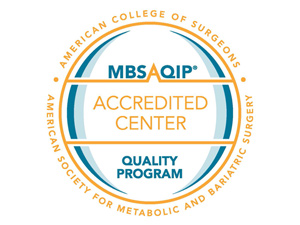Weight Loss Surgery Frequently Asked Questions
Weight Loss Surgery: Frequently Asked Questions
Here are some answers to some common questions about weight loss surgery and how to know if it's right for you:
Who is a candidate for weight loss surgery?
You can be a candidate for weight loss surgery if you have a body mass index (BMI) between 35 kg/m2 and 39 kg/m2 with a weight-related health condition like diabetes, hypertension or sleep apnea; or have a BMI of 40+ kg/m2 with or without any weight-related health conditions.
What is body mass index (BMI)?
Your body mass index measures your weight in relation to your height: The resulting number determines whether you are underweight, normal weight, overweight or obese.
What types of weight loss surgeries do you perform?
At Mount Sinai South Nassau weight loss surgeries can be performed laparoscopically or robotically. These are minimally invasive surgical technologies that can be discussed with your surgeon during your consultation.
What kind of success rate can I expect?
Approximately 70-80 percent of patients who have weight loss surgery experience long-term success. To achieve and maintain your success long-term, you must follow the dietary guidelines, follow-up with you surgeon, remain active, and when needed seek behavioral guidance.
Will I need any preoperative tests?
Yes, there are a series of preoperative tests that are required before the surgery. During your consultation, your surgeon will discuss them with you.
Is weight loss surgery covered by insurance?
Most but not all insurance companies will cover bariatric surgery; please check with your particular carrier.
How will my diet change after surgery?
You will discuss with you dietitian the goals and changes needed to achieve your success in leading a healthy lifestyle. You will focus on protein foods, vegetables, fruits and water. Foods high in sugar and other carbohydrates should be avoided.
Do I need special care when I arrive home?
Most patients do not need any special assistance after discharge. A small number of patients with physical disabilities before surgery may require extra assistance.
Are there post-surgical follow-up meetings to guide me?
Yes, your bariatric surgeon and a dietitian meet with you during postoperative and follow-up visits to help you maintain your weight goal and lead a healthy lifestyle: It's all an important part of our team approach to care.
Learn More
If you've been struggling with weight loss, the Bariatric and Metabolic Program at Mount Sinai South Nassau can help. To learn more call (516) 377-5336.

Body Mass Index (BMI)
Body Mass Index (BMI) is calculated by using a person’s height and weight and determines your weight category...
Read More

Types of Weight Loss Surgery
Whether or not surgery is right for you is a discussion you should have with your weight loss surgeon...
Read More

Revisional Weight Loss Surgery
If you have already had bariatric surgery and had complications or did not successfully lose weight, the experts...
Read More

Weight Loss Success Stories
With over 5,000 weight loss surgery procedures performed, Mount Sinai South Nassau has many patients...
Read More

Support After Weight Loss Surgery
The Bariatric and Metabolic Program offers comprehensive follow-up care, including a support group...
Read More

Meet Our Team
We offer a team approach to weight loss. Our highly skilled bariatric staff is committed to providing you with ongoing support...
Read More

Accrediations & Certifications
Our award-winning program, led by renowned weight loss surgeon Dr. Rajeev Vohra, provides our patients...
Read More

Weight Loss Surgery Frequently Asked Questions
Here are some answers to some common questions about weight loss surgery and how to know if it's right for you...
Read More

The Dietitian's Corner
Changing your Diet is an Essential Part of Weight Loss...
Read More